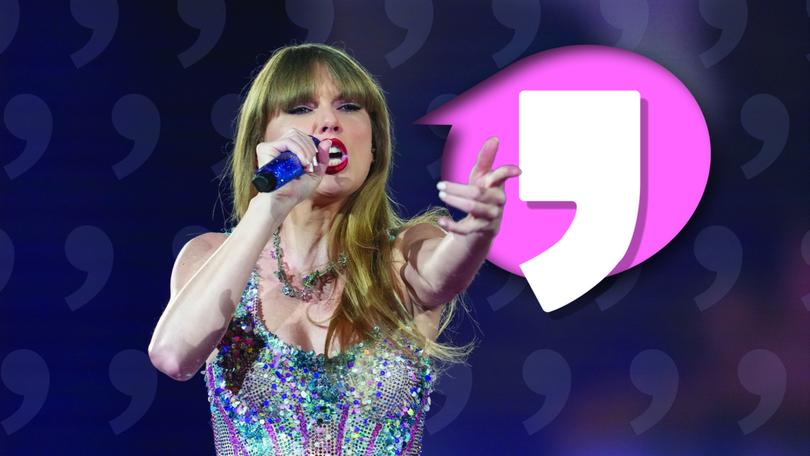The New York Times: Tortured poets’ or poets? Taylor Swift meets the apostrophe police
If your first reaction when Taylor Swift announced her new album ‘The Tortured Poets Department’ was ‘shouldn’t there be an apostrophe in that title?’ - you’re not alone.

When Taylor Swift announced at the Grammys that the title of her new album would be “The Tortured Poets Department,” what was your reaction?
Maybe it was: “My gosh! Her first new album in more than a year. I can’t wait!”
Maybe it was: “Ho-hum. I’d rather listen to Shostakovich/Metallica/Baby Shark.”
Sign up to The Nightly's newsletters.
Get the first look at the digital newspaper, curated daily stories and breaking headlines delivered to your inbox.
By continuing you agree to our Terms and Privacy Policy.Or, just possibly, it could have been:
“Shouldn’t there be an apostrophe in that title?”
Yes, plenty of people, upon hearing the biggest music announcement of the year, started thinking about diacritical marks and then talking about them on social media.
“I ruined this album release for my students by making it a lesson on apostrophe usage,” Erin Weinberg, an instructor in the department of English, theater, film and media at the University of Manitoba, wrote on X, formerly known as Twitter. (Others opined via Reddit, TikTok and elsewhere.)
If you do insist on adding an apostrophe, there are two potential places. It could be before the “S”: The Tortured Poet’s Department. That means the department belongs to just one poet.
“Is it a department just for a single tortured poet, where they can sit alone and write tortured poetry?” Weinberg asked.
Or after the “S”: The Tortured Poets’ Department, a department of many poets. “A designated department where all tortured poets can inspire together?” Weinberg asked.
But the title as it officially reads has no apostrophe: “The Tortured Poets Department.” It’s like those other great apostrophe-less works of art “Dead Poets Society” and “The Baby-Sitters Club.” In this case, the department does not belong to the poets. “Poets” describes the department.
“Nouns can be attributive, which just means we can use them to describe things the same way we use adjectives,” said Mignon Fogarty, the host of the “Grammar Girl” podcast. “‘Tortured Poets’ is telling us what kind of department it is, the same way ‘Cosmetics’ is telling us what kind of department we’re visiting at Macy’s.”
So which way should the title be? Before you decide that a feud on the scale of Kanye West versus Taylor Swift is breaking out, be aware that the consensus of professional grammarians is: It’s really up to Swift.
First off, none of the possible titles is wrong. “Each version is grammatically correct, but conveys its own unique meaning.” Weinberg said.
And grammarians say not only that Swift has the choice of which to use, she probably also has chosen the right one for her intended meaning.
“I find the apostrophe-free option to be by far the most appealing and logical option,” said Ellen Jovin, author of “Rebel With a Clause: Tales and Tips From a Roving Grammarian.” “I am guessing there are multiple tortured poets, and I understand ‘poets’ adjectivally. It’s a department of tortured poets. I wouldn’t want an apostrophe there! I trust Taylor Swift’s apostrophe use.”
“The title is fine without an apostrophe; the Department of Veterans Affairs doesn’t use one,” said Mark Bulik, the assistant standards editor at The New York Times. “What’s good enough for the official nomenclature of the United States government should be good enough for Taylor Swift.”
Weinberg likes Swift’s choice as well: “I’d like to think of the tortured poets collectively hanging out together in a department of their own, a space to feel their feelings and write about them in a supportive environment.”
Because Swift is everywhere and everything these days, you won’t be surprised to learn that this is not the first time she has made grammar-related news.
In 2015, a fan pointed out that an apostrophe seemed to be incorrectly missing from “it’s” in some handwritten lyrics Swift had posted.
Swift responded by noting that the apostrophe was there but obscured by the trailing leg of a “Y” above it. She finished by politely pointing out three errors in the fan’s own post.
Is there anything Taylor Swift can’t do?
This article originally appeared in The New York Times.
© 2024 The New York Times Company
Originally published on The New York Times
